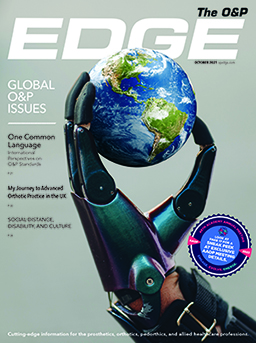Follow Up on S.829 and New Proposed Regulations on Appeals
Follow Up on S.829 and New Proposed Regulations on Appeals 5:28
May 07, 2017
S. 829 Follow Up: The Medicare Orthotic and Prosthetic Improvement Act (S. 829) continues to gain cosponsors in the Senate, thanks to the efforts of O&P practitioners and patients across the nation who have been contacting their members of the U.S. Senate asking them for support. NAAOP members have done their part in reaching out to key Senate offices seeking additional support for this important legislation. The bill would recognize the clinical notes of the O&P practitioner as part of the patient’s medical record, separate DME from O&P, and accomplish a number of other important O&P policy improvements. If you have not yet contacted your Senators, we ask you to do so now. Just go to www.NAAOP.org and click on the Legislative Action Center. The July webcast provides detailed instructions to assist in accomplishing this important task.
We now ask you to go the extra mile and invite your Congressman and Senators to visit your clinic during this political season. All Members of Congress and one third of the Senate are up for reelection in this election cycle and ALL of them are actively looking for ways to meet constituents, align themselves with attractive human interest stories, appeal to voters, and gain unpaid media attention. There is no better way to do this than to visit an O&P clinic, tour the facility, and meet patients whose lives have been touch by O&P care. CONTACT your Congressman and Senators today and request to schedule a visit at your clinic during the month of August, early September and in the weeks leading up to the November election. There is no better time to help develop O&P champions through this one-on-one advocacy.
Proposed Regulations Issued for Medicare ALJ Appeals: In early July, the Office of Medicare Hearings and Appeals (OMHA) issued new regulations that propose to make significant changes to the Medicare administrative appeals process. Most of these changes are detrimental to providers but some are more positive. The regulations were presumably issued to try to address the deepening appeals crisis. There are over 750,000 appeals pending at the OMHA and the agency has capacity to resolve only 77,000 cases each year. This means a 10-year backlog of cases, and the denials and related appeals keep entering the system faster than they can be resolved. The average time for an ALJ appeal to be decided is reported by OMHA as 832 days, despite the statutory requirement that such decisions occur within 90 days. In short, the situation is unsustainable.
NAAOP is working with the O&P Alliance to file comments on these proposed regulations by the deadline on August 29th. We are opposed to the proposal to make the 90-day deadline for ALJ decisions permissive rather than mandatory, as the statute requires. We also oppose granting authority to the Medicare Appeals Council (MAC) to pick and choose which cases will have precedential value, meaning if one case is denied at the MAC, similar cases in the appeals backlog may also be denied. Finally, we support other provisions in the proposed rule that would make it easier for providers to get a fair hearing and not be overwhelmed by Medicare contractors in the course of the ALJ hearing itself. In short, we will seek to protect the interests of O&P providers and the patients we serve in the context of this proposed regulation.




















-
-
-
-
CONTACT US